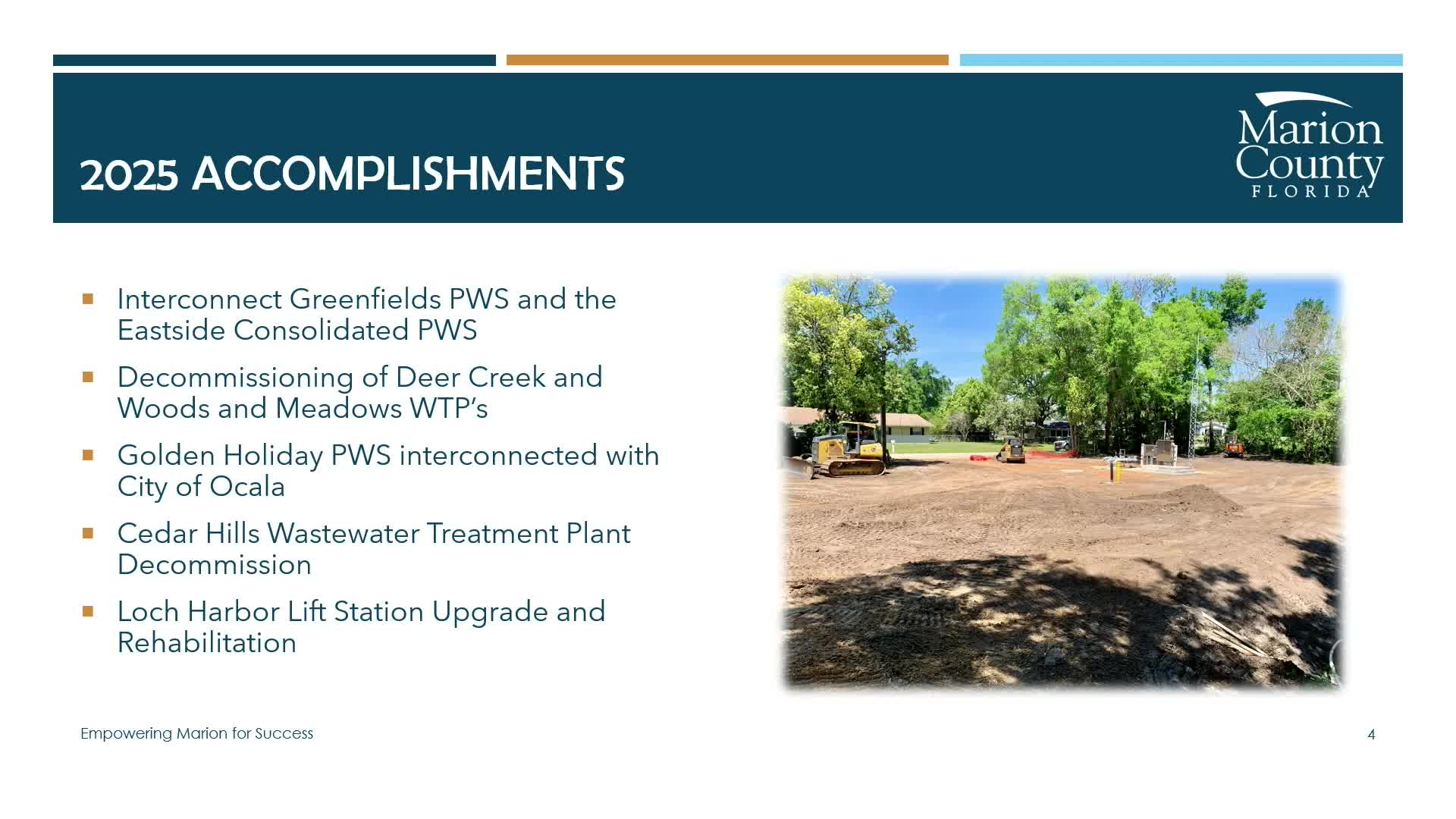Water Utility Secures $3.5M for Lowell Water Main Extension and Southeast Plant Development
April 28, 2025 | Marion County, Florida
This article was created by AI summarizing key points discussed. AI makes mistakes, so for full details and context, please refer to the video of the full meeting. Please report any errors so we can fix them. Report an error »

In a recent workshop held by the Marion County Board of County Commissioners, discussions centered on the Utilities Capital Improvement Program, highlighting significant advancements and future projects aimed at enhancing the county's water systems. The meeting, which took place on April 28, 2025, underscored the importance of interconnecting water systems to improve efficiency, water quality, and cost-effectiveness.
One of the key topics was the development of loop systems, which allow for water to be redirected from one part of the system to another in case of disruptions. This adaptability not only enhances water quality but also optimizes pressure within the systems, ultimately reducing operational costs. The commissioners emphasized the need for such systems, particularly in seasonal areas where certain wells may remain unused.
A major focus of the meeting was the funding received through the American Rescue Plan Act (ARPA) and other sources, which has significantly influenced the county's utility projects over the past year. Notably, an appropriation of $3.5 million was allocated for the Lowell Water Main Extension, aimed at providing water access to key facilities, including a fire college, a prison, and local residents. This funding is expected to facilitate the development of a comprehensive water system in the area.
Additionally, the workshop addressed the Southeast Regional Water Plant, which is set to utilize a Lower Floridian well as an alternative water source. This initiative is crucial for protecting the local environment by minimizing the impacts of water withdrawals from the Upper Florida aquifer. The project is currently in the testing phase, with plans to construct a plant around the new well, contingent on the water quality results.
However, concerns were raised regarding the potential costs associated with utilizing the Lower Floridian aquifer. Some commissioners questioned whether the treatment of water from this source would be economically viable in the long term. The response highlighted that the feasibility of this approach largely depends on the water quality obtained from the well. If the quality is satisfactory, it could represent a significant advantage for the county; if not, additional treatment may be necessary, which could increase costs.
In conclusion, the workshop provided a platform for discussing critical infrastructure improvements in Marion County's water systems. The decisions made and funding secured during this meeting are expected to have lasting impacts on the community's water supply and environmental sustainability. As the county moves forward with these projects, ongoing assessments of water quality and cost-effectiveness will be essential in ensuring the success of these initiatives.
One of the key topics was the development of loop systems, which allow for water to be redirected from one part of the system to another in case of disruptions. This adaptability not only enhances water quality but also optimizes pressure within the systems, ultimately reducing operational costs. The commissioners emphasized the need for such systems, particularly in seasonal areas where certain wells may remain unused.
A major focus of the meeting was the funding received through the American Rescue Plan Act (ARPA) and other sources, which has significantly influenced the county's utility projects over the past year. Notably, an appropriation of $3.5 million was allocated for the Lowell Water Main Extension, aimed at providing water access to key facilities, including a fire college, a prison, and local residents. This funding is expected to facilitate the development of a comprehensive water system in the area.
Additionally, the workshop addressed the Southeast Regional Water Plant, which is set to utilize a Lower Floridian well as an alternative water source. This initiative is crucial for protecting the local environment by minimizing the impacts of water withdrawals from the Upper Florida aquifer. The project is currently in the testing phase, with plans to construct a plant around the new well, contingent on the water quality results.
However, concerns were raised regarding the potential costs associated with utilizing the Lower Floridian aquifer. Some commissioners questioned whether the treatment of water from this source would be economically viable in the long term. The response highlighted that the feasibility of this approach largely depends on the water quality obtained from the well. If the quality is satisfactory, it could represent a significant advantage for the county; if not, additional treatment may be necessary, which could increase costs.
In conclusion, the workshop provided a platform for discussing critical infrastructure improvements in Marion County's water systems. The decisions made and funding secured during this meeting are expected to have lasting impacts on the community's water supply and environmental sustainability. As the county moves forward with these projects, ongoing assessments of water quality and cost-effectiveness will be essential in ensuring the success of these initiatives.
View full meeting
This article is based on a recent meeting—watch the full video and explore the complete transcript for deeper insights into the discussion.
View full meeting